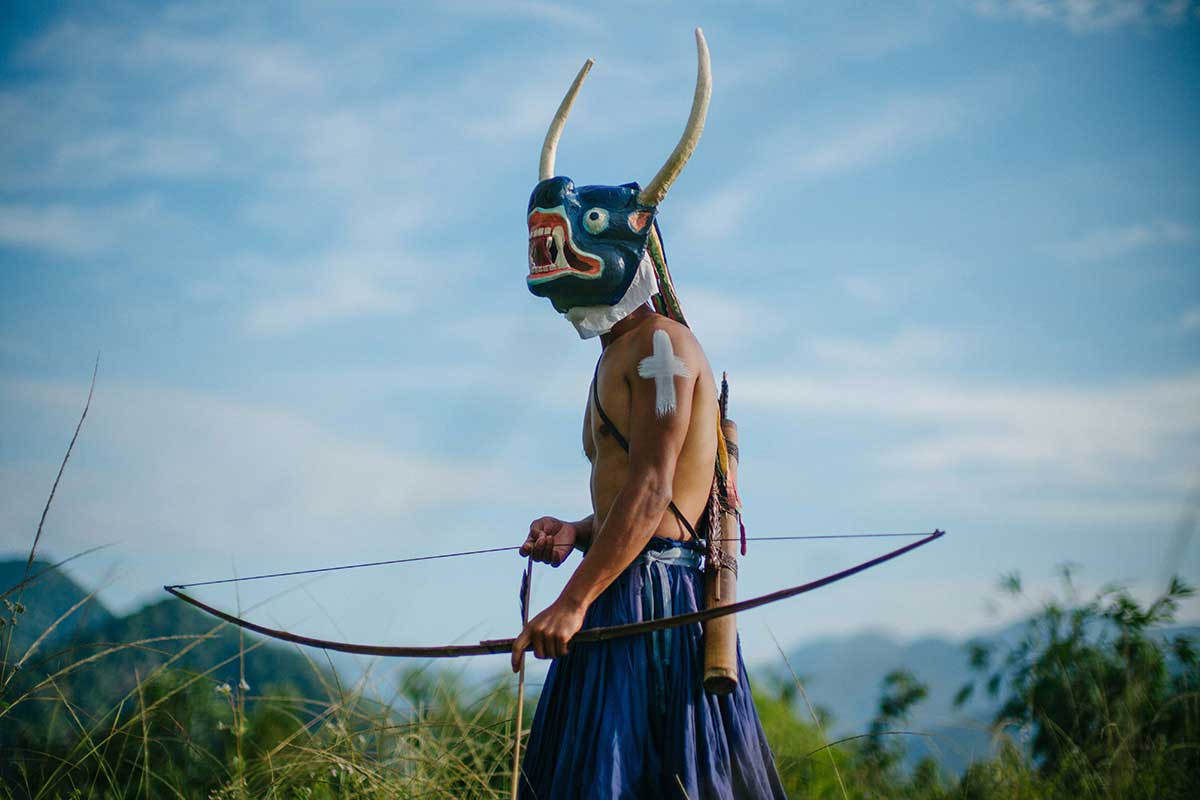Variety reviews ‘Hema Hema: Sing Me a Song While I Wait’
A group of people don masks and come together in the woods for fifteen days of liberating and transgressive anonymity in this Buddhist-themed, intriguing Bhutanese drama.
JAY WEISSBERG – VARIETY – 30th August 2016
The exoticism of Bhutan and the spiritual philosophy of Buddhism combine with an eerie invented ritual by which masked anonymity allows participants to inhabit a limbo world of the present that excludes the past and future in lama/director Khyentse Norbu’s visually rich though narratively challenging “Hema Hema: Sing Me a Song While I Wait.” How successful the film is in folding Buddhist ideas into an imaginative reflection on the liberating yet unstable notion of collective identity concealment depends entirely on the viewer’s awareness of certain Eastern spiritual concepts, and uninitiated audiences looking for foreign color will experience a hefty degree of head-scratching among the intermittent pleasures. While never less than intriguing, “Hema Hema,” like Norbu’s previous “Vara: A Blessing,” is unlikely to break out of the festival circuit.
Since working as technical adviser on “Little Buddha,” Norbu has grown into a fully-fledged director (this is his fifth feature), with international visibility assisted by his association with Jeremy Thomas, once again acting as executive producer notwithstanding the majority Bhutanese production. Seeking to incorporate contemporary society’s mores with Buddhist beliefs, Norbu’s films play with ideas of transgression and reinvention, informed by the spiritual philosophy of inhabiting intermediary spaces poised between death and rebirth. Familiarity with such concepts certainly help to greater appreciate the underlying notion behind “Hema Hema,” which is mostly set in a commune-like forest clearing where participants don masks and revel in the collective freedom of effaced identities.
A man, credited as “Expressionless” (Tshering Dorji) makes his way to a secret forest where, every 12 years, people are gathered by the elderly Agay (Thinley Dorji) for 15 days of anonymity. Amid revelry and dances, this masked rag-tag community is strictly enjoined from removing their masks; they shed their past and are without names, exulting in the freedom of being unknown.
One need only think of Carnival practices to realize that such a concept isn’t entirely foreign to Western society — putting on a mask in public allows for barriers to be dropped and instinct to reign. But such freedom comes at a cost, and human foibles can fester as lust and jealousy build in the heated atmosphere. Expressionless develops a powerful desire for “Red Wrathful” (Sadon Lhamo), and he breaks the rules of both the commune and society in an act that spirals out of control.
Most people outside of Bhutanese culture will likely assume much of the film is based on native rituals, imagining they’re watching a stylized anthropological evocation of local traditions. The truth is otherwise: apart from a couple of dances and a few masks, nearly everything in “Hema Hema” is invention. In fact, alongside Buddhist spirituality, Norbu claims influence from chat rooms, whose constructed anonymity, not to say deliberate misrepresentation, was an inspiration for the idea of a masked community indulging in freedom while unsuccessfully attempting to regulate transgression. Ensuring that audiences don’t think the film is set in some mythic past, he bookends the main story with images from a hip nightclub, where a cocktail waitress (Zhou Xun) appears to contemplate her place in this world.
“Hema Hema” translates as “long, long ago” or alternatively “Once upon a time,” thereby playing with audience perception of time and space: It seems that Norbu means to evoke a timeless limbo, that liminal area between death and rebirth (hence the title’s English-language addition, “Sing Me a Song While I Wait.”). Yet while the film is visually appealing, it holds viewers at a distance by its sheer opaqueness. The performers (nearly all nonprofessional) have a difficult time conveying expression when their faces are almost always covered in head-enveloping masks, and the invented exoticism adds a hefty layer of obfuscation.
Fortunately, it’s easy to appreciate the beauty of the forested locale, shot in Bhutan’s south east, at times dappled with sunlight and at others, darkly menacing; the contrast between these outdoor spaces and the cold, ultra-designed nightclub couldn’t be greater. Colorful masks add to the eye’s pleasure even while creating a deliberately frustrating barrier.

